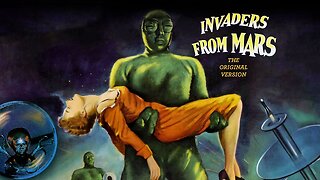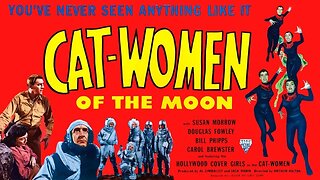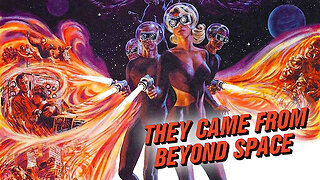Aelita: Queen of Mars (1924 Russian Silent Sci-Fi film)
Aelita (Russian: Аэли́та, pronounced [ɐɛˈlʲitə]), also known as Aelita: Queen of Mars, is a 1924 Soviet silent science fiction film directed by Yakov Protazanov and produced at the Mezhrabpom-Rus film studio. It was based on Alexei Tolstoy's 1923 novel of the same name. Nikolai Tseretelli and Valentina Kuindzhi were cast in leading roles.
Though the main focus of the story are the daily lives of a small group of people during the post-war Soviet Union, the film's enduring importance comes from its early sci-fi elements. It primarily tells of an engineer Mstislav Sergeyevich Los (Russian: Лось) traveling to Mars in a rocket ship, where he leads a popular uprising against the ruling group of Elders, with the support of Queen Aelita who has fallen in love with him after watching him through a telescope. In its performances in the cinemas in Leningrad, Dmitri Shostakovich played on the piano the music he provided for the film.
In the United States, Aelita was edited and titled by Benjamin De Casseres for release in 1929 as Aelita: Revolt of the Robots.
Plot
Moscow, 1921. A mysterious wireless message is received by various stations: its text is 'Anta Odeli Uta'. Someone facetiously suggests it has come from Mars, in order to tease Los (Nikolai Tseretelli), an engineer who is obsessed with the idea of going to Mars. This inspires him to daydream about Mars and a strange civilization there. We see Aelita (Yuliya Solntseva), the queen; Tuskub (Konstantin Eggert), the actual ruler; and Ikhoshka (Aleksandra Peregonets), Aelita's mischievous maid. They live in a society where aristocrats rule over slaves who are confined underground and put into cold storage when not required.
Los's wife Natasha (Valentina Kuindzhi) is pestered by Erlikh (Pavel Pol), a bourgeois playboy before the revolution who is now a dishonest minor official. He uses his connections to steal a large amount of sugar with the intention of selling it on the black market. Los, who has seen Erlikh making up to Natasha but has not seen her rejecting him, becomes jealous.
Los continues to daydream, he imagines that Aelita has access to a telescope by which she can see people on Earth and has become attracted to him.
Spiridonov (Nikolai Tseretelli again), an intellectual engineer and friend of Los's, is being quietly swindled by Erlikh. He disappears; a would-be detective, Kratsov (Igor Ilyinsky) (who has been rejected by the police) suspects Spiridonov to be guilty of the theft of the sugar, because of his disappearance.
Cast
Yuliya Solntseva as Aelita, Queen of Mars
Igor Ilyinsky as Kravtsov – amateur sleuth
Nikolai Tseretelli as Engineer Los / Evgeni Spiridonov
Nikolay Batalov as Gusev, Red Army Soldier
Vera Orlova as Nurse Masha, Gusev's Wife
Valentina Kuindzhi as Natasha, Los' Wife (as Vera Kuindzhi)
Pavel Pol as Viktor Erlich, Sugar Profiteer
Konstantin Eggert as Tuskub, Ruler of Mars
Yuri Zavadsky as Gol, Radiant Energy Tower Guardian
Aleksandra Peregonets as Ikhoshka, Aelita's Maidservant
Sofya Levitina as President House Committee
Influences
One of the earliest full-length films about space travel, the most notable segment remains its remarkable constructivist Martian sets by Isaac Rabinovich and Victor Simov and costumes designed by Aleksandra Ekster. Their influence can be seen in a number of later films, including the Flash Gordon serials and probably Fritz Lang's Metropolis and Woman in the Moon and the more recent Liquid Sky.
Parts of the plot were loosely adapted for the 1951 film Flight to Mars.
J. Hoberman of The Village Voice wrote that the 1960 American film Beyond the Time Barrier "suggests an impoverished remake" of Aelita.
While initially very popular, it later fell out of favor with the Soviet government and was thus very difficult to see until after the Cold War.
Reception
In a retrospective on Soviet science fiction film, British filmmaker Alex Cox remarking on BFI Southbank's celebration of "Eastern Bloc science fiction" called Aelita "Strangest of these [...] in which the human pastime of kissing creates turmoil on the red planet."
-
 48:59
48:59
TeslaWirelessRadio
2 months agoThe Dying Swan (English Subtitles) (Russian) (1917 Drama film)
29 -
 1:19:32
1:19:32
WEin5DTarot
1 month ago $0.05 earnedInvaders From Mars (1953 Full Movie) | Sci-Fi/Thriller
749 -
 1:03:43
1:03:43
WEin5DTarot
2 months agoCat-Women of The Moon (1953 Full Movie) | Sci-Fi
606 -
 1:28:00
1:28:00
BaggyPants
1 month agoGreat Martian War 1913 To 1917 Nikola Tesla An Alien Intelligence Full Documentary
487 -
 1:28:25
1:28:25
Lost n Found Films
1 month agoTEVYA (1939) Maurice Schwartz, Miriam Risselle & Rebecca Weintraub | Drama, Yiddish | COLORIZED
69 -
 1:25:23
1:25:23
WEin5DTarot
30 days ago $0.02 earnedThey Came From Beyond Space (1967 Full Movie) | Sci-Fi/Horror
644 -
 1:31:09
1:31:09
WEin5DTarot
2 months ago $0.04 earnedDestination Moon (1950 Full Movie) | Sci-Fi
679 -
![Target: Earth (1998 Full Movie) [Unrelated to the 1954 Film of the Same Name] | Sci-Fi/Horror](https://hugh.cdn.rumble.cloud/s/s8/1/D/A/f/R/DAfRq.0kob.1-small-Target-Earth-1998-Full-Movi.jpg) 1:30:09
1:30:09
WEin5DTarot
2 months ago $0.09 earnedTarget: Earth (1998 Full Movie) [Unrelated to the 1954 Film of the Same Name] | Sci-Fi/Horror
715 -
 15:11
15:11
JVReviewofMovies1954
1 month agoTwo Women 1960 Movie Review
673 -
 1:22:06
1:22:06
Lost n Found Films
1 month agoCOSSACKS IN EXILE aka Запорожець за Дунаєм (1939) Maria Sokil & F. Braznick | Drama, Musical | B&W
48